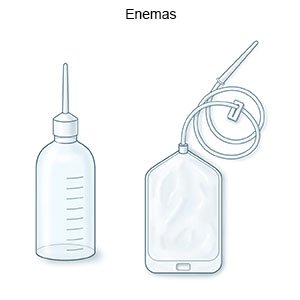Constipation
Medically reviewed by Drugs.com. Last updated on Aug 4, 2025.
Constipation means you have hard, dry bowel movements, or you go longer than usual between bowel movements.
DISCHARGE INSTRUCTIONS:
Call your doctor if:
- You have blood in your bowel movements.
- You have a fever and abdominal pain with the constipation.
- Your constipation gets worse.
- You start to vomit.
- You have questions or concerns about your condition or care.
Medicines:
- Medicine such as a laxative may help relax and loosen your intestines to help you have a bowel movement. Your provider may recommend you only use laxatives for a short time. Long-term use can damage your bowel function over time.
- Take your medicine as directed. Contact your healthcare provider if you think your medicine is not helping or if you have side effects. Tell your provider if you are allergic to any medicine. Keep a list of the medicines, vitamins, and herbs you take. Include the amounts, and when and why you take them. Bring the list or the pill bottles to follow-up visits. Carry your medicine list with you in case of an emergency.
Related medications
Treatment options
The following list of medications are related to or used in the treatment of this condition.
Relieve constipation:
- A suppository may be used to help soften your bowel movements. This may make them easier to pass. A suppository is guided into your rectum through your anus.

- An enema is liquid medicine used to clear bowel movement from your rectum. The medicine is put into your rectum through your anus.

Prevent constipation:
- Drink liquids as directed. You may need to drink extra liquids to help soften and move your bowels. Ask how much liquid to drink each day and which liquids are best for you.
- Eat high-fiber foods. This may help decrease constipation by adding bulk to your bowel movements. High-fiber foods include fruit, vegetables, whole-grain breads and cereals, and beans. Your healthcare provider or dietitian can help you create a high-fiber meal plan. Your provider may also recommend a fiber supplement if you cannot get enough fiber from food.

- Exercise regularly. Regular physical activity can help stimulate your intestines. Walking is a good exercise to prevent or relieve constipation. Ask which exercises are best for you.

- Schedule a time each day to have a bowel movement. This may help train your body to have regular bowel movements. Bend forward while you are on the toilet to help move the bowel movement out. Sit on the toilet for at least 10 minutes, even if you do not have a bowel movement.
- Talk to your healthcare provider about your medicines. Certain medicines, such as opioids, can cause constipation. Your provider may be able to make medicine changes. For example, he or she may change the kind of medicine, or change when you take it.
Follow up with your doctor as directed:
Write down your questions so you remember to ask them during your visits.
© Copyright Merative 2025 Information is for End User's use only and may not be sold, redistributed or otherwise used for commercial purposes.
The above information is an educational aid only. It is not intended as medical advice for individual conditions or treatments. Talk to your doctor, nurse or pharmacist before following any medical regimen to see if it is safe and effective for you.
Learn more about Constipation
Treatment options
Care guides
Medicine.com guides (external)
Further information
Always consult your healthcare provider to ensure the information displayed on this page applies to your personal circumstances.
